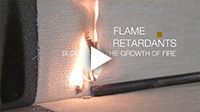

Annual Progress Report
ANNUAL VECAP PROGRESS REPORT DELIVERS IMPROVED RESULTS
TBBPA POTENTIAL EMISSIONS SUBSTANTIALLY REDUCED
The Voluntary Emissions Control Action Programme (VECAP) European Annual Progress Report, released today, shows a significant overall reduction in potential emissions of flame retardants to the environment; representing the most significant achievement in the programme since its beginning.
Testimony to the success of the scheme is the reduction of Tetrabromobisphenol-A's (TBBPA) potential land emissions to zero and the drop in potential water and air emissions to the lowest achievable level, demonstrating a good uptake in Best Available Techniques by users.
Further development of the voluntary programme led to a better understanding of user disposal practices, resulting in a significant drop in potential emissions of Decabromodiphenyl ether (Deca-BDE) to land. In addition, potential emissions to air have progressively decreased over the last four years.
Implementation of best practices in handling Hexabromocyclododecane (HBCD) packaging waste by a large majority of users resulted in a significant reduction in potential emissions to land since data collection started four years ago.
The number of sites meeting strict VECAP guidelines and obtaining third party certification grew from five to ten. This expansion now includes all manufacturing sites in Europe and spans from the US to China and is set to cover other flame retardants.
Over the years, the scheme run by the European Flame Retardant Association (EFRA) has grown into a truly global product stewardship programme operating under the tenets of Responsible Care® to safely manage chemicals, above and beyond regulatory requirements.
View the Annual Progress Report

-
"Proceeding with a voluntary undertaking like VECAP allows a continued use of a chemical substance when, for example, there are concerns about its harmfulness, but it is nonetheless considered essential to society. We hope that this undertaking will continue to go forward smoothly, with the understanding of the concerned business entities."Japanese Ministry of Economy, Trade and Industry (METI)









